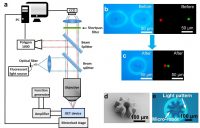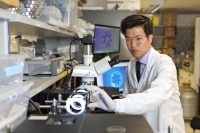Optoelectronic tweezers (OET) is a useful optofluidic micromanipulation technology that relies on light-induced dielectrophoresis (DEP) for touch-free, noninvasive actuation of micro-scale objects in physical, chemical and biomedical studies. One key challenge for OET technology is the lack of suitable light source capable of coupling with microscope to provide fast and easy-programmable illumination patterns. This limits the application of OET for efficient and precise micromanipulation applications. The conventional solution is to use a digital micromirror device (DMD) projector. However, due to the function of DMD projector, the build-in optics are mainly designed for amplification applications, which makes it difficult for the light pattern to be coupled with a microscope and normally comes with a cost of high transmission loss (over 70%).
In our recent work, we used the Polygon 1000 from Mightex, which can be easily adapted to a standard upright microscope. The Polygon 1000 is capable of providing fast, wavelength-tunable, high-power and easy-programmable illumination patterns via a user-friendly interface, which allows us to perform some important OET experiments. Figure 1 shows the schematic of our experimental setup used for OET experiments in which Polygon1000 is the light pattern illuminator.

Figure 1. Schematic of Experimental Setup
Based on the above experimental setup, we demonstrated the use of Polygon 1000 for some interesting applications, which include:
Application 1: Use dynamic light pattern to move and rotate multiple 10-μm-diameter microparticles
Application 2: Use light pattern to assemble microparticles into a micro-pattern depicting a stylized caricature of Marie Curie with symbols of Erlenmeyer ask and radiation
Application 3: Use light pattern to driven a micro-gear-train
Application 4: Use light pattern to drive a micro- rack and pinion system, which functions as micro-valve to open and close microfluidic channels
These results demonstrate the capability of Mightex’s Polygon system for diverse applications in micromanipulation, micro-assembly, micromachinery and microfluidics.
Bio
 Shuailong Zhang finished his PhD in physics at Institute of Photonics, University of Strathclyde (UK) in 2016. He is currently working at University of Toronto as a postdoctoral fellow at Professor Aaron Wheeler’s group. His research topics cover optoelectronic tweezers, microrobotics, microfluidics and microfabrication. Shuailong has published 28 peer-reviewed journal articles, 30 conference papers and delivered 10 oral presentations at international conferences.
Shuailong Zhang finished his PhD in physics at Institute of Photonics, University of Strathclyde (UK) in 2016. He is currently working at University of Toronto as a postdoctoral fellow at Professor Aaron Wheeler’s group. His research topics cover optoelectronic tweezers, microrobotics, microfluidics and microfabrication. Shuailong has published 28 peer-reviewed journal articles, 30 conference papers and delivered 10 oral presentations at international conferences.



